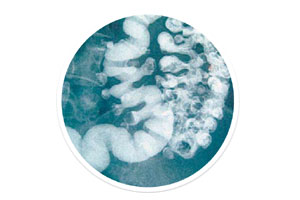The diseases that affect the digestive apparatus find their origin in microorganisms, bad diet or an excessive consumption of alcoholic beverages. Some of the most common disorders are:
– Cirrhosis: it is a chronic hepatic disease that causes fibrosis (scarring) and dysfunction of the liver. The main causes are alcoholism and infection from the hepatitis C virus. The symptoms are vomiting with blood in it, icterus (skin with a yellow coloration), general weakness, abdominal inflammation, weight loss and renal disorders.
– Celiac disease: it is an autoimmune and hereditary affliction that causes chronic inflammation of the walls of the small intestine in response to the ingest of gluten (a protein of wheat, oats, barley and rye).
– Barrett’s syndrome or esophagus (BE): it is a disorder characterized by a change in the cells that line the esophagus. Normal cells have a flattened shape (scaly), while in Barrett’s esophagus cells have a column shape. This change is known as metaplasia and it is a pre-malignant stage that can end up in esophageal cancer. The exact causes that produce this affliction are unknown, but it may come from damage in the esophagus caused by chronic gastroesophageal reflux.
– Gastroparesis: it is a disorder in which the stomach takes too long in emptying its contents causing the excessive growth of bacteria because of its fermentation. The main cause is damage or loss of functionality of the vagus nerve (controls the movement of food through the digestive tube).
Afflictions in the intestines
– Diverticular disease: affects the inferior part of the large intestine (colon) and consists of the formation of small pouches called diverticula (or diverticulosis) and in the inflammation of these diverticula (diverticulitis).It is believed to be caused by the slow mobilization of chyme through this intestine.
– Crohn’s disease or ailment: it is an autoimmune disease that involves a chronic inflammation of the lining of the intestines. As a consequence of this inflammation, the compromised intestinal segment can develop ulcers, fistulas (abnormal connection between organs and tissues) or stenosis (narrowing).Also, the capacity to absorb nutrients might be lost. The main symptoms are chronic diarrhea, abdominal pain, fever, weight loss and elimination of mucus through the anus.
– Colon polyps: they are masses of tissue (normally benign) that protrude from the mucosa of the colon. One or multiple polyps can be formed which will present no symptoms at first, but will start bleeding in time. There are two types of polyps, adenomatous, which can turn into cancer, and hyperplasic, which are not generally malignant.
– Hirschsprung’s disease: it is a congenital disorder that causes obstruction of the large intestine due to its abnormal movement. It causes intestinal and abdominal inflammation.








 En 1973 muere Pablo Neruda
En 1973 muere Pablo Neruda